Chicken breast is a significant food protein choice in bodybuilding and fitness. Chicken breast is the meat cut from the pectoral part of the chicken. It is preferred because it has low calories but is rich in proteins essential for building muscle mass. Many people believe that the only way to get a healthy high protein meal is to eat a chicken breast with a side of vegetables. But that meal can get pretty boring pretty fast! One of the easiest ways to fail in weight loss goals is to get bored with eating healthy foods.
It’s important to add some diversity to your meals not only for the sake of taste, but also for the diversity of nutrients. Chicken breast can be substituted with other food proteins that serve the same purpose. Some of the protein substitutes that can replace chicken breasts and still help in bodybuilding and fitness.
Turkey Breast

Turkey breast is a lean source of high-quality protein, making it a popular choice among bodybuilders, athletes, and health enthusiasts alike. Its similarities with chicken breast in taste, texture, and nutritional profile make it an excellent alternative for those looking to diversify their protein sources.
Protein
Turkey breast is packed with protein, which is vital for muscle repair and growth. A 3 oz. serving of cooked turkey breast provides around 24 to 27 grams of protein. Like chicken, this protein is complete, meaning it provides all the essential amino acids required by the body.
Low in Fat
Turkey breast, especially the skinless variety, is low in fat. It’s an excellent option for those who are monitoring their dietary fat intake.
Rich in Vitamins and Minerals
Turkey is a good source of several essential vitamins and minerals, including B-vitamins (notably niacin and B6), phosphorus, and zinc. These nutrients are crucial for various bodily functions, including energy production, DNA synthesis, and cognitive health.
Selenium
Turkey breast is particularly rich in selenium, a trace mineral that plays a pivotal role in DNA synthesis, protection from oxidative damage, and thyroid hormone metabolism.
Duck Breast
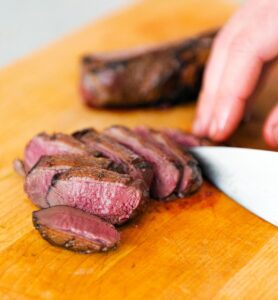
Duck breast stands as a luxurious alternative to chicken, boasting a richer flavor and succulent texture, making it particularly enticing for culinary enthusiasts and athletes alike.
Nutritional Advantages
Duck breast is not only high in protein, which is paramount for muscle repair and growth, but it’s also rich in various micronutrients. For instance, it contains more iron than chicken, which aids in oxygen transportation, crucial for those engaging in strenuous workouts. Its higher myoglobin content, which is responsible for its darker hue, stores oxygen in muscle cells, ensuring muscles receive the oxygen needed during rigorous exercise.
Taste and Culinary Uses
The robust flavor of duck breast can add a gourmet touch to meals, elevating ordinary recipes. For bodybuilders or fitness enthusiasts who relish gastronomy, it can bring a refreshing change from the routine chicken dishes.
Fat Content
It’s pivotal to note that duck breast, especially with the skin on, tends to be higher in fat than chicken. However, a considerable portion of this fat is heart-healthy monounsaturated fats. For those closely watching their fat intake, removing the skin before cooking is advisable.
Versatility in Cooking: While duck breast requires a slightly modified approach to achieve its signature crispy skin and tender interior, it can easily be substituted in most recipes that call for chicken. For optimal results, it’s often recommended to score the skin, which allows fat to render effectively and ensures a crispy finish.
Pork Tenderloin
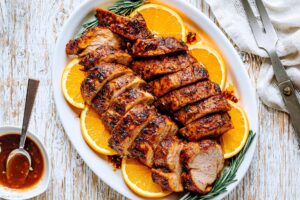
Pork tenderloin is a commendable alternative for bodybuilders and fitness enthusiasts looking to diversify their protein sources beyond chicken.
Nutritional Profile
This lean cut of meat offers a substantial protein content, essential for muscle synthesis, repair, and overall growth. Pork tenderloin also provides a rich source of essential vitamins and minerals. In particular, it is abundant in B-vitamins (notably B1, thiamine), selenium, and phosphorus. These nutrients are vital for various bodily functions, including energy production and muscle function.
Comparable Texture
The texture of pork tenderloin is reminiscent of chicken breast, which can make the transition easier for those substituting it in their diets
Salmon

Salmon is a powerhouse protein choice for bodybuilders and those focused on holistic fitness.
Nutritional Advantages
Salmon’s protein content is not only crucial for muscle building but also for the repair and maintenance of muscle tissue. Its rich omega-3 fatty acid content, particularly EPA and DHA, offers anti-inflammatory benefits, crucial for recovery after strenuous workouts. The inflammation reduction can potentially lead to reduced muscle soreness post-exercise.
Essential Nutrients
Beyond protein and omega-3s, salmon is a prime source of essential vitamins and minerals. Vitamins like B12 and niacin are key players in energy metabolism, and vitamin D plays a role in bone health, a factor sometimes overlooked in bodybuilding. Additionally, the mineral selenium, abundantly found in salmon, supports the body’s antioxidant defenses, which can be beneficial after intense training sessions.
Heart Health
The cardiovascular benefits of salmon, owing to its omega-3 content, cannot be overstated. A healthy heart can support improved athletic performance and stamina.
Consideration in Source
While both wild-caught and farmed salmon offer nutritional benefits, wild-caught is often preferred. Wild salmon typically has a more diverse nutrient profile and is less likely to contain harmful contaminants. It’s also worth noting that the omega-3 content can vary between the two, with wild salmon often having an edge.
Steak
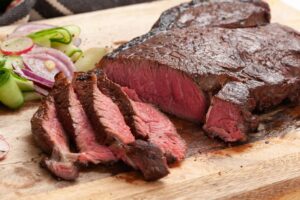
Steak is a beloved protein choice for many, offering not only a rich, satisfying taste but also a wealth of nutritional benefits, especially for those engaged in physical activity or muscle-building endeavors.
Protein
One of the standout nutritional attributes of steak is its high protein content. A 3 oz. serving of cooked beef (depending on the cut) can provide between 20 to 25 grams of high-quality protein. This protein provides all the essential amino acids, making it a complete protein source, crucial for muscle repair, growth, and overall body maintenance.
Zinc
Steak is a significant source of zinc, essential for the immune system, DNA synthesis, and protein production. Consuming zinc-rich foods can also aid in wound healing and improving one’s sense of taste and smell.
Iron
The heme iron present in steak is more readily absorbed by the body compared to non-heme iron found in plant sources. This makes steak an essential dietary component for individuals who need a boost in their iron levels, such as athletes or those with iron-deficiency anemia.
B Vitamins
Rich in essential B vitamins, particularly B12, niacin, and riboflavin. These vitamins play a pivotal role in energy production, red blood cell formation, and neurological function.
Creatine
Steak naturally contains creatine, a compound revered by athletes and bodybuilders for its role in energy production during short-duration, high-intensity activities.
Healthy Fats
While steak does have saturated fats, it also boasts beneficial monounsaturated fats. These fats, when consumed in moderation, can have a positive impact on heart health.
MIXED NUTS

Nuts are not just delicious but also packed with an array of essential nutrients that can benefit health in numerous ways
Nutrient Density
Mixed nuts are a powerhouse of nutrients. They provide a mix of protein, healthy fats (especially monounsaturated and polyunsaturated fats), fiber, vitamins, and minerals. Some commonly consumed nuts include almonds, walnuts, cashews, pistachios, and pecans.
Heart Health
Nuts have been associated with better heart health. They contain omega-3 fatty acids, which can help reduce harmful LDL cholesterol and inflammation in the body. Moreover, the presence of antioxidants like vitamin E in nuts protects the heart by combating oxidative stress.
Brain Function
Walnuts, in particular, are rich in alpha-linolenic acid (ALA), a type of Omega-3 fatty acid known to support brain health. Additionally, the antioxidants in nuts might protect the brain from the effects of aging.
Weight Management
Even though nuts are calorie-dense, they can play a crucial role in weight management. Their protein and fiber content can make you feel full, reducing overall calorie consumption. Research suggests that the body might not even absorb all the calories from nuts, making them less impactful on weight than one might assume.
Moderation is Key
Despite their numerous health benefits, it’s essential to consume nuts in moderation due to their high-calorie content. Overeating can lead to excessive calorie intake, so it’s a good idea to stick to a handful or roughly a 1 oz. serving per day.
GREEK YOGURT
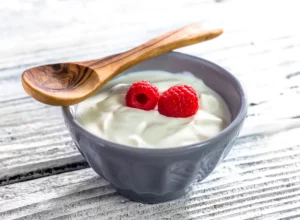
Greek yogurt stands out from its conventional counterparts due to its distinct texture and nutrient profile:
Protein Packed
Greek yogurt undergoes a straining process that removes whey, giving it a thicker consistency and concentrating its protein content. Depending on the brand, a typical serving of Greek yogurt can offer between 12-20 grams of protein, which can help in muscle repair and growth.
Probiotics
This yogurt is rich in live active cultures like Lactobacillus acidophilus and Bifidobacterium, which are beneficial for gut health. These probiotics can aid digestion, boost the immune system, and potentially help in reducing symptoms of certain gastrointestinal conditions.
Calcium and Vitamin B12
It’s a good source of calcium, vital for bone health, and Vitamin B12, essential for nerve function and the production of red blood cells.
Lower Lactose
Due to its straining process, Greek yogurt has less lactose compared to regular yogurt. This can be beneficial for those who are lactose intolerant, although individual reactions may vary.
Bone Health
Apart from calcium, Greek yogurt also contains phosphorus, magnesium, and potassium, which are vital for maintaining bone health and can potentially prevent osteoporosis.
Eggs
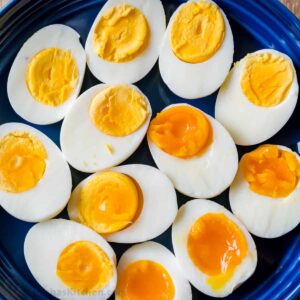
Eggs are nutritional powerhouses that have long been a staple in many diets. Here are some reasons why
Complete Protein Source
Each egg is packed with about 6 grams of protein, containing all nine essential amino acids required by the body. This makes eggs an exceptional source of complete protein.
Rich in Vitamins and Minerals
Eggs are a natural source of many essential nutrients including vitamin D, B6, B12, and minerals such as zinc, iron, and copper. They also contain choline, which is essential for brain and nerve function.
Eye Health
The carotenoids lutein and zeaxanthin found in eggs are powerful antioxidants that help combat age-related macular degeneration and cataracts, two major causes of vision loss in older adults.
Good Fats
Despite the bad reputation of the yolk due to cholesterol concerns, it’s rich in healthy fats. Recent studies have shown that the cholesterol in eggs doesn’t necessarily raise the cholesterol in the bloodstream. Moreover, the yolk contains omega-3 fatty acids, beneficial for heart and brain health.
Satiety and Weight Management
Due to their high protein content, eggs can make you feel full for longer periods, reducing the need for snacking and helping in weight management.
Cost-Effective
Eggs are relatively inexpensive compared to other protein sources, making them an economical choice for many households.
Conclusion
Incorporating a diverse range of protein sources into one’s diet is not just about breaking the monotony of meals but also about reaping a rich spectrum of nutrients. From the lean profiles of turkey and chicken to the omega-3 richness of salmon, and from the heart-healthy fats of nuts to the wholesome goodness of eggs, there’s a treasure trove of nutritional benefits waiting to be explored. However, it’s crucial to note that each individual’s dietary needs and preferences are unique.
While chicken breast remains a formidable contender in the world of fitness nutrition, branching out to other protein sources can offer both culinary delight and a broadened nutritional intake. As with all dietary choices, moderation, balance, and attentiveness to one’s body remain the guiding principles. Whether you’re a seasoned bodybuilder or someone embarking on a fitness journey, diversifying your protein portfolio can be a rewarding adventure for both the palate and the physique.



